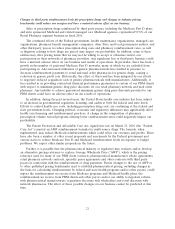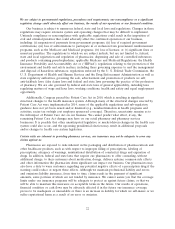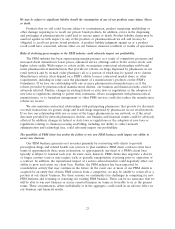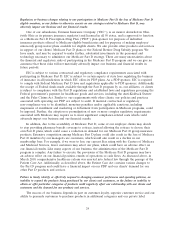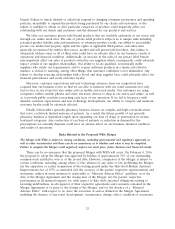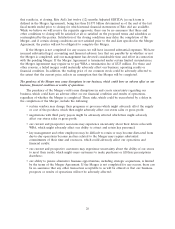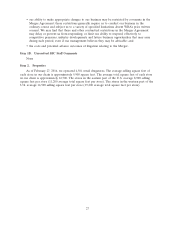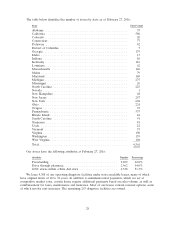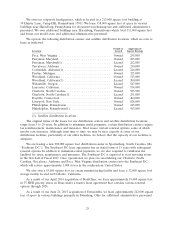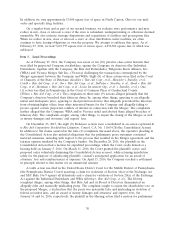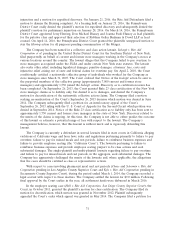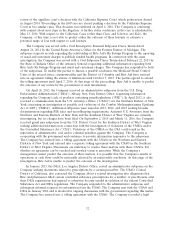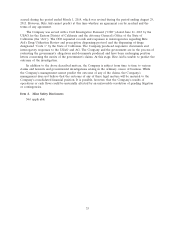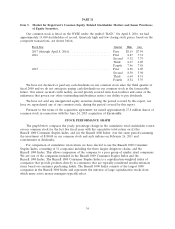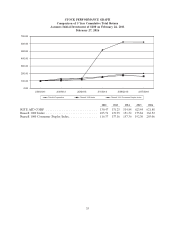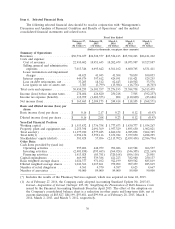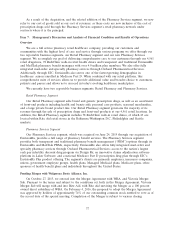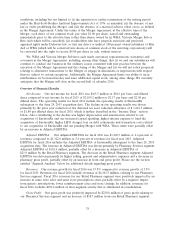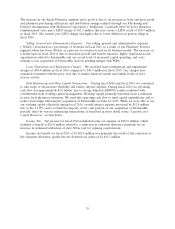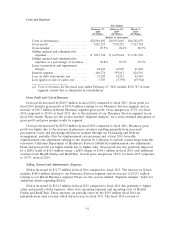Rite Aid 2016 Annual Report Download - page 31
Download and view the complete annual report
Please find page 31 of the 2016 Rite Aid annual report below. You can navigate through the pages in the report by either clicking on the pages listed below, or by using the keyword search tool below to find specific information within the annual report.injunction and a motion for expedited discovery. On January 21, 2016, the Rite Aid Defendants filed a
motion to dismiss the Herring complaint. At a hearing held on January 25, 2016, the Pennsylvania
District Court orally denied the plaintiff’s motion for expedited discovery and subsequently denied the
plaintiff’s motion for preliminary injunction on January 28, 2016. On March 14, 2016, the Pennsylvania
District Court appointed Jerry Herring, Don Michael Hussey and Joanna Pauli Hussey as lead plaintiffs
for the putative class and approved their selection of Robbins Geller Rudman & Dowd LLP as lead
counsel. On April 14, 2016, the Pennsylvania District Court granted the plaintiffs’ unopposed motion to
stay the Herring action for all purposes pending consummation of the Merger.
The Company has been named in a collective and class action lawsuit, Indergit v. Rite Aid
Corporation et al. pending in the United States District Court for the Southern District of New York,
filed purportedly on behalf of current and former store managers working in the Company’s stores at
various locations around the country. The lawsuit alleges that the Company failed to pay overtime to
store managers as required under the FLSA and under certain New York state statutes. The lawsuit
also seeks other relief, including liquidated damages, punitive damages, attorneys’ fees, costs and
injunctive relief arising out of state and federal claims for overtime pay. On April 2, 2010, the Court
conditionally certified a nationwide collective group of individuals who worked for the Company as
store managers since March 31, 2007. The Court ordered that Notice of the Indergit action be sent to
the purported members of the collective group (approximately 7,000 current and former store
managers) and approximately 1,550 joined the Indergit action. Discovery as to certification issues has
been completed. On September 26, 2013, the Court granted Rule 23 class certification of the New York
store manager claims as to liability only, but denied it as to damages, and denied the Company’s
motion for decertification of the nationwide collective action claims. The Company filed a motion
seeking reconsideration of the Court’s September 26, 2013 decision which motion was denied in June
2014. The Company subsequently filed a petition for an interlocutory appeal of the Court’s
September 26, 2013 ruling with the U. S. Court of Appeals for the Second Circuit which petition was
denied in September 2014. Notice of the Rule 23 class certification as to liability only has been sent to
approximately 1,750 current and former store managers in the state of New York. Discovery related to
the merits of the claims is ongoing. At this time, the Company is not able to either predict the outcome
of this lawsuit or estimate a potential range of loss with respect to the lawsuit. The Company’s
management believes, however, that this lawsuit is without merit and is vigorously defending this
lawsuit.
The Company is currently a defendant in several lawsuits filed in state courts in California alleging
violations of California wage and hour laws, rules and regulations pertaining primarily to failure to pay
overtime, failure to pay for missed meals and rest periods, failure to reimburse business expenses and
failure to provide employee seating (the ‘‘California Cases’’). The lawsuits pertaining to failure to
reimburse business expenses and provide employee seating purport to be class actions and seek
substantial damages. The single-plaintiff and multi-plaintiff lawsuits regarding failure to pay overtime
and failure to pay for missed meals and rest periods, in the aggregate, seek substantial damages. The
Company has aggressively challenged the merits of the lawsuits and, where applicable, the allegations
that the cases should be certified as class or representative actions.
With respect to cases involving pharmacist meal and rest periods (Chase and Scherwin v. Rite Aid
Corporation pending in Los Angeles County Superior Court and Kyle v. Rite Aid Corporation pending in
Sacramento County Superior Court), during the period ended March 1, 2014, the Company recorded a
legal accrual with respect to these matters. The Company settled the lawsuit for $9.0 million. Following
final approval by the Court earlier in the year, all settlement funds were disbursed in March 2016.
In the employee seating case (Hall v. Rite Aid Corporation, San Diego County Superior Court), the
Court, in October 2011, granted the plaintiff’s motion for class certification. The Company filed its
motion for decertification, which motion was granted in November 2012. Plaintiff subsequently
appealed the Court’s order which appeal was granted in May 2014. The Company filed a petition for
31


